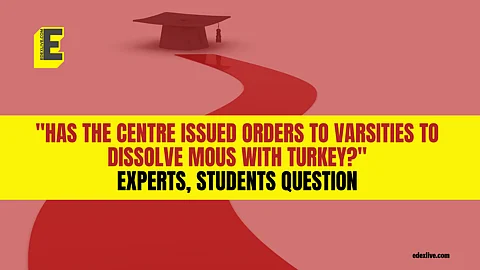

The recent suspension of Memoranda of Understanding (MoUs) between Indian universities and institutions in Turkey and Azerbaijan, citing "national security" concerns, has sparked debates about the encroachment of ideologically driven agendas into academic spaces.
Universities such as Jamia Millia Islamia (JMI), Jawaharlal Nehru University (JNU), Maulana Azad National Urdu University (MANUU), Lovely Professional University (LPU), Kanpur University, Tata Institute of Social Sciences (TISS), the Indian Institute of Technology (IIT) Roorkee have suspended academic agreements with Turkish and Azerbaijani institutions in response to geopolitical tensions, particularly Turkey's support for Pakistan during India-Pakistan tensions and Operation Sindoor.
Do these actions highlight the implications for academic freedom, campus democracy, and the role of educational institutions as being independent? Let's listen to what these students and experts have to say.
On May 15, 2025, JMI announced the suspension of all MoUs with Turkish institutions, stating, "Due to national security considerations, any Memorandum of Understanding (MoU) between Jamia Millia Islamia, New Delhi, and any institution affiliated with the Government of the Republic of Türkiye stands suspended with immediate effect, until further orders. Jamia Millia Islamia stands firmly with the Nation."
Similar actions were taken by:
- JNU on May 14
- MANUU on May 16
- LPU on May 16
- Kanpur University on May 16
- TISS on May 17
- IIT Roorkee on May 17
Interference in academic spaces
The suspension of MoUs represents the dissolution of academic autonomy and freedom. JNU Students Union (JNUSU) President, Nitish Kumar, told EdexLive, "These MoUs are agreed upon for a reason, and dissolving them due to nationalistic fervour... There is some ideological backing going on in universities such as JNU, Jamia, MANUU, and now TISS. Is this happening for the students' welfare? Why are ideologies intervening in academic spaces?"
Surajit Majumdar, the newly elected president of the Jawaharlal Nehru University Teachers Association told EdexLive that while there has been no clarity over the objection behind this. "Academic isolation is hardly a desirable end game. There is a clear distinction between the Turkish state and the universities in that country. They are independent of each other, as academics in Turkiye have faced persecution just as is happening in India," he said.
Professor Abha Dev Habib, an Associate Professor at Miranda House, University of Delhi (DU), argued, "The war has spilled into academia," questioning why universities are siding with dominant ideologies under external pressure.
She asked, "Why are vice-chancellors of the universities siding with propaganda? Has the government issued an order for them to do that? Has the government issued sanctions on Turkey?" suggesting that such actions are directed at appeasing the ruling party.
Impact on students
The suspension of MoUs may have direct consequences for students, particularly those enrolled in programmes tied to these institutions. At JMI, the Department of Turkish Studies might suffer, as funding from the Turkish embassy may be discontinued, and scholarships like the Türkiye Bursları (scholarship) for students hoping to pursue master’s degrees in Turkey are at risk.
A student pursuing their BA in Turkish Studies at JMI said, "The department used to receive funding from the Turkish embassy, which might be discontinued... The Bursları for the students wanting to pursue a Master's in Turkey might be discontinued due to the current situation affecting those students who filled out the form for it recently."
He further informed EdexLive that courses and exams are continuing as scheduled, but there has been a lack of clarity on what will happen.
Erosion of democratic spaces
Universities are meant to serve as democratic spaces where diverse perspectives can coexist. However, it is now being threatened by dominant ideologies, alleged Saurabh, a member of the All India Students' Association (AISA), Jamia.
He said, "In February, Jamia suspended almost 17 students because they were exercising their freedom of speech within a democratic space. There’s a rising nationalistic hysteria being endorsed by VCs of universities, why should that happen even?"
Saurabh cited the example of Harvard University, which has opposed any external pressure from the government so far. He questioned why Indian universities can't adopt a similar stance.
Professor Abha further warned that such actions "might complicate foreign policies more", and harm students and the academic community.
She questions these erratic suspensions, saying, "Today, Trump announced that Apple production would not take place in India. Are we now going against every nation and placing sanctions because they are an enemy of our country?"
She also emphasised that dissolving such MoUs might have taken precedence, but questioned why universities are not addressing pressing institutional challenges such as funding and infrastructure.
"The focus now has been removed from the functioning of the universities to MoU cancellation due to geopolitical tensions," she said, and remarked, "It is certainly not easy to build MoUs, and now they are walking out of these like they are of no importance," limiting opportunities for students and researchers.
